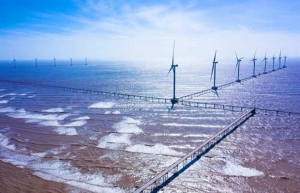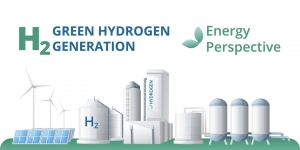Green hydrogen: a strategic leap towards sustainability
What is green hydrogen and why is it increasingly on the radar recently?
Green hydrogen, produced through electrolysis powered by renewable energy sources like wind, solar, or hydropower, is a carbon-free alternative to traditional hydrogen production methods, which rely on fossil fuels. Unlike grey hydrogen, which emits significant CO2 during production, green hydrogen is completely clean, making it a key player in the global transition to sustainable energy.
 |
| RMIT senior lecturer of Logistics and Supply Chain Management Dr. Majo George |
Its environmental benefits and versatility across sectors such as transportation, industry, and power generation make green hydrogen increasingly critical as nations strive to meet net-zero emissions targets. This technology offers a viable solution for decarbonising industries that are challenging to electrify, and provides opportunities for energy storage and transportation.
The potential of green hydrogen extends beyond environmental sustainability; it also represents a significant economic opportunity. Countries like Germany, Japan, and Australia have successfully integrated green hydrogen into their energy mix, recognising its potential to boost economic growth and enhance global competitiveness. These nations are leading the charge in green hydrogen adoption, positioning themselves as key players in the future of clean energy.
As the world focuses on sustainability, coupled with advancements in technology and decreasing costs of renewable energy, green hydrogen has been propelled to the forefront of energy discussions. Governments and corporations worldwide are investing heavily in green hydrogen projects, seeing it as a cornerstone of a sustainable and resilient energy system and a new avenue for economic growth.
Is green hydrogen a viable solution for a developing, fossil fuel reliant country like Vietnam?
The short answer is yes. Vietnam is facing a pivotal moment in its energy strategy. With increasing concerns over climate change, energy security, and economic resilience, the country must embrace innovative alternatives to fossil fuels. Among these, green hydrogen is a promising and versatile clean energy source.
In February, Vietnam launched its hydrogen development strategy towards 2030 with a vision to 2050. The country aims to produce 100,000-500,000 tonnes of hydrogen per year from renewable energy and other processes with carbon capture by 2030. That’s an ambitious yet necessary goal.
I think Vietnam can get inspired by India. In 2023, the country announced the launch of its National Green Hydrogen Mission. There have been some particularly successful green hydrogen initiatives in the state of Kerela, where I’m originally from, and they can offer a valuable blueprint for Vietnam.
Kerala has become a standout example, not just by using renewable energy sources like solar and wind for hydrogen production, but by integrating green hydrogen into a broader ecosystem of sustainable development. The state is leveraging its hydrogen production for both domestic use and export. This strategy not only reduces carbon emissions but also positions Kerala as a leader in creating a comprehensive, future-ready energy infrastructure.
In South America, Chile is leveraging its solar and wind energy potential to become a top producer and exporter of green hydrogen, even setting a goal to create the cheapest green hydrogen on the planet by 2030 and become one of the world’s top three exporters by 2040. A lot of other developing countries are also looking into green hydrogen. Vietnam could greatly benefit by studying their innovative approaches and adapting them to local contexts.
Can you elaborate on why Vietnam should embrace green hydrogen?
There are five main reasons here. Firstly, it is about energy security and independence. Vietnam’s heavy reliance on fossil fuel imports exposes it to market volatility and geopolitical risks. The country can generate clean energy by investing in green hydrogen, bolster energy security, and reduce dependency on foreign sources.
Secondly, green hydrogen can bring economic advantages. The high cost of importing fossil fuels strains Vietnam’s economy. Domestic green hydrogen production can significantly cut these costs, allowing the nation to redirect savings into vital sectors like healthcare, education, and infrastructure, thus promoting comprehensive economic development.
Next, this is a way to fulfill the country’s environmental responsibility. Vietnam is committed to reducing greenhouse gas emissions and transitioning to a low-carbon economy. Green hydrogen offers a zero-emission solution, helping the country achieve its environmental goals while improving air quality and public health.
There is also potential for industrial and technological innovation. The production of green hydrogen involves advanced technologies that can drive innovation and create skilled jobs. By developing this sector, Vietnam can establish itself as a regional leader in clean energy, attracting global investments and expertise.
Finally, global market competitiveness can be an enticing reason. As the international community moves towards sustainable energy, early investment in green hydrogen can position Vietnam as a critical player in this burgeoning market, especially within Southeast Asia. By becoming a green hydrogen exporter, Vietnam can contribute to global sustainability efforts and enhance its economic standing.
 | Support policies needed to develop green hydrogen The Government should implement support policies to ensure the development and competitiveness of clean hydrogen sources in the country. |
 | Elements of a green hydrogen future Vietnam’s economy and sustained growth rate, has attracted attention, achieving a swift economic expansion. |
 | Vietnam showing special interest in hydrogen Hydrogen is one of Vietnam's priority areas as it focuses on implementing a green transformation strategy for the upcoming decades, according to Prime Minister Pham Minh Chinh. |
 | Siemens Energy to develop green hydrogen in Binh Dinh German energy giant Siemens Energy expressed its desire to implement the Green Hydrogen Gas System project in Binh Dinh during a visit by a delegation from the central province to Berlin on July 17. |
 | Potential is there for hydrogen alternative Although Vietnam’s green hydrogen market remains at its early stages, there have been some developments to unlock it. Markus Bissel, project director of the International Hydrogen Ramp-up Programme from GIZ Vietnam, spoke with VIR’s Thanh Van with an overview of Vietnam’s green hydrogen market. |
What the stars mean:
★ Poor ★ ★ Promising ★★★ Good ★★★★ Very good ★★★★★ Exceptional
Related Contents
Latest News
More News
- Citi economists project robust Vietnam economic growth in 2026 (February 14, 2026 | 18:00)
- Sustaining high growth must be balanced in stable manner (February 14, 2026 | 09:00)
- From 5G to 6G: how AI is shaping Vietnam’s path to digital leadership (February 13, 2026 | 10:59)
- Cooperation must align with Vietnam’s long-term ambitions (February 13, 2026 | 09:00)
- Need-to-know aspects ahead of AI law (February 13, 2026 | 08:00)
- Legalities to early operations for Vietnam’s IFC (February 11, 2026 | 12:17)
- Foreign-language trademarks gain traction in Vietnam (February 06, 2026 | 09:26)
- Offshore structuring and the Singapore holding route (February 02, 2026 | 10:39)
- Vietnam enters new development era: Russian scholar (January 25, 2026 | 10:08)
- 14th National Party Congress marks new era, expands Vietnam’s global role: Australian scholar (January 25, 2026 | 09:54)

 Tag:
Tag:



















 Mobile Version
Mobile Version